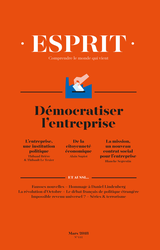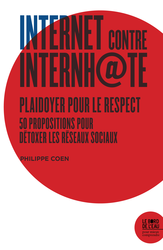Thesaurus : Doctrine

► Full Reference: R. Sève, "L'Obligation de Compliance et les mutations de la souveraineté et de la citoyenneté" ("Compliance Obligation and changes in Sovereignty and Citizenship"), in M.-A. Frison-Roche (ed.), L'obligation de Compliance, Journal of Regulation & Compliance (JoRC) and Dalloz, coll. "Régulations & Compliance", 2024, forthcoming.
____
📕read the general presentation of the book, L'obligation de Compliance, in which this article is published.
____
► English Summary of this article (done by the Journal of Regulation & Compliance - JoRC) : The contribution describes "les changements de philosophie du droit que la notion de compliance peut impliquer par rapport à la représentation moderne de l’Etat assurant l’effectivité des lois issues de la volonté générale, dans le respect des libertés fondamentales qui constituent l’essence du sujet de droit." ("the changes in legal philosophy that the notion of Compliance may imply in relation to the modern representation of the State ensuring the effectiveness of laws resulting from the general will, while respecting the fundamental freedoms that constitute the essence of the subject of law").
The contributor believes that the definition of Compliance is due to authors who « jouer un rôle d’éclairage et de structuration d’un vaste ensemble d’idées et de phénomènes précédemment envisagés de manière disjointe. Pour ce qui nous occupe, c’est sûrement le cas de la théorie de la compliance, développée en France par Marie-Anne Frison-Roche dans la lignée de grands économistes (Jean-Jacques Laffont, Jean Tirole) et dont la première forme résidait dans les travaux bien connus de la Professeure sur le droit de la régulation. » ( "play a role in illuminating and structuring a vast set of ideas and phenomena previously considered in a disjointed manner. For our purposes, this is certainly the case with the theory of Compliance, developed in France by Marie-Anne Frison-Roche in the tradition of great economists (Jean-Jacques Laffont, Jean Tirole) and whose first form was in her well-known work on Regulatory Law").
Drawing on the Principles of the Law of the American Law Institute, which considers compliance to be a "set of rules, principles, controls, authorities, offices and practices designed to ensure that an organisation conforms to external and internal norms", he stresses that Compliance thus appears to be a neutral mechanism aimed at efficiency through a move towards Ex Ante. But he stresses that the novelty lies in the fact that it is aimed 'only' at future events, by 'refounding' and 'monumentalising' the matter through the notion of 'monumental goals' conceived by Marie-Anne Frison-Roche, giving rise to a new jus comune. Thus, "la compliance c’est l’idée permanente du droit appliquée à de nouveaux contextes et défis." ("Compliance is the permanent idea of Law applied to new contexts and challenges").
So it's not a question of making budget savings, but rather of continuing to apply the philosophy of the Social Contract to complex issues, particularly environmental issues.
This renews the place occupied by the Citizen, who appears not only as an individual, as in the classical Greek concept and that of Rousseau, but also through entities such as NGOs, while large companies, because they alone have the means to pursue the Compliance Monumental Goals, would be like "super-citizens", something that the digital space is beginning to experience, at the risk of the individuals themselves disappearing as a result of "surveillance capitalism". But in the same way that thinking about the Social Contract is linked to thinking about capitalism, Compliance is part of a logical historical extension, without any fundamental break: "C’est le développement et la complexité du capitalisme qui forcent à introduire dans les entités privées des mécanismes procéduraux d’essence bureaucratique, pour discipliner les salariés, contenir les critiques internes et externes, soutenir les managers en place" ("It is the development and complexity of capitalism that forces us to introduce procedural mechanisms of a bureaucratic nature into private entities, in order to discipline employees, contain internal and external criticism, and support the managers in place") by forcing them to justify remuneration, benefits, and so on.
Furthermore, in the words of the author, "Avec les buts monumentaux, - la prise en compte des effets lointains, diffus, agrégés par delà les frontières, de l’intérêt des générations futures, de tous les êtres vivants - , on passe, pour ainsi dire, à une dimension industrielle de l’éthique, que seuls de vastes systèmes de traitement de l’information permettent d’envisager effectivement." ("With the Monumental Goals - taking into account the distant, diffuse effects, aggregated across borders, the interests of future generations, of all living beings - we move, so to speak, to an industrial dimension of ethics, which only vast information processing systems can effectively envisage").
This is how we can find a division between artificial intelligence and human beings in organisations, particularly companies, or in decision-making processes.
In the same way, individual freedom does not disappear with Compliance, because it is precisely one of its monumental goals to enable individuals to make choices in a complex environment, particularly in the digital space where the democratic system is now at stake, while technical mechanisms such as early warning will revive the right to civil disobedience, invalidating the complaint of "surveillance capitalism".
The author concludes that the stakes are so high that Compliance, which has already overcome the distinctions between Private and Public Law and between national and international law, must also overcome the distinction between Information and secrecy, particularly in view of cyber-risks, which requires the State to develop and implement non-public Compliance strategies to safeguard the future.
________
Thesaurus : Doctrine

► Full Reference: R. Sève, "Compliance Obligation and changes in Sovereignty and Citizenship", in M.-A. Frison-Roche (ed.), Compliance Obligation, Journal of Regulation & Compliance (JoRC) and Bruylant, "Compliance & Regulation" Serie, to be published
____
📘read a general presentation of the book, Compliance Obligation, in which this article is published
____
► Summary of the article (done by the Journal of Regulation & Compliance - JoRC):
The contribution describes "les changements de philosophie du droit que la notion de compliance peut impliquer par rapport à la représentation moderne de l’Etat assurant l’effectivité des lois issues de la volonté générale, dans le respect des libertés fondamentales qui constituent l’essence du sujet de droit." ("the changes in legal philosophy that the notion of Compliance may imply in relation to the modern representation of the State ensuring the effectiveness of laws resulting from the general will, while respecting the fundamental freedoms that constitute the essence of the subject of law").
The contributor believes that the definition of Compliance is due to authors who « jouer un rôle d’éclairage et de structuration d’un vaste ensemble d’idées et de phénomènes précédemment envisagés de manière disjointe. Pour ce qui nous occupe, c’est sûrement le cas de la théorie de la compliance, développée en France par Marie-Anne Frison-Roche dans la lignée de grands économistes (Jean-Jacques Laffont, Jean Tirole) et dont la première forme résidait dans les travaux bien connus de la Professeure sur le droit de la régulation. » ( "play a role in illuminating and structuring a vast set of ideas and phenomena previously considered in a disjointed manner. For our purposes, this is certainly the case with the theory of Compliance, developed in France by Marie-Anne Frison-Roche in the tradition of great economists (Jean-Jacques Laffont, Jean Tirole) and whose first form was in her well-known work on Regulatory Law").
Drawing on the Principles of the Law of the American Law Institute, which considers compliance to be a "set of rules, principles, controls, authorities, offices and practices designed to ensure that an organisation conforms to external and internal norms", he stresses that Compliance thus appears to be a neutral mechanism aimed at efficiency through a move towards Ex Ante. But he stresses that the novelty lies in the fact that it is aimed 'only' at future events, by 'refounding' and 'monumentalising' the matter through the notion of 'monumental goals' conceived by Marie-Anne Frison-Roche, giving rise to a new jus comune. Thus, "la compliance c’est l’idée permanente du droit appliquée à de nouveaux contextes et défis." ("Compliance is the permanent idea of Law applied to new contexts and challenges").
So it's not a question of making budget savings, but rather of continuing to apply the philosophy of the Social Contract to complex issues, particularly environmental issues.
This renews the place occupied by the Citizen, who appears not only as an individual, as in the classical Greek concept and that of Rousseau, but also through entities such as NGOs, while large companies, because they alone have the means to pursue the Compliance Monumental Goals, would be like "super-citizens", something that the digital space is beginning to experience, at the risk of the individuals themselves disappearing as a result of "surveillance capitalism". But in the same way that thinking about the Social Contract is linked to thinking about capitalism, Compliance is part of a logical historical extension, without any fundamental break: "C’est le développement et la complexité du capitalisme qui forcent à introduire dans les entités privées des mécanismes procéduraux d’essence bureaucratique, pour discipliner les salariés, contenir les critiques internes et externes, soutenir les managers en place" ("It is the development and complexity of capitalism that forces us to introduce procedural mechanisms of a bureaucratic nature into private entities, in order to discipline employees, contain internal and external criticism, and support the managers in place") by forcing them to justify remuneration, benefits, and so on.
Furthermore, in the words of the author, "Avec les buts monumentaux, - la prise en compte des effets lointains, diffus, agrégés par delà les frontières, de l’intérêt des générations futures, de tous les êtres vivants - , on passe, pour ainsi dire, à une dimension industrielle de l’éthique, que seuls de vastes systèmes de traitement de l’information permettent d’envisager effectivement." ("With the Monumental Goals - taking into account the distant, diffuse effects, aggregated across borders, the interests of future generations, of all living beings - we move, so to speak, to an industrial dimension of ethics, which only vast information processing systems can effectively envisage").
This is how we can find a division between artificial intelligence and human beings in organisations, particularly companies, or in decision-making processes.
In the same way, individual freedom does not disappear with Compliance, because it is precisely one of its monumental goals to enable individuals to make choices in a complex environment, particularly in the digital space where the democratic system is now at stake, while technical mechanisms such as early warning will revive the right to civil disobedience, invalidating the complaint of "surveillance capitalism".
The author concludes that the stakes are so high that Compliance, which has already overcome the distinctions between Private and Public Law and between national and international law, must also overcome the distinction between Information and secrecy, particularly in view of cyber-risks, which requires the State to develop and implement non-public Compliance strategies to safeguard the future.
____
🦉This article is available in full text to those registered for Professor Marie-Anne Frison-Roche's courses
________
Sept. 1, 2022
Thesaurus : Doctrine

► Full reference: André, Ch., Souveraineté étatique, souveraineté populaire : quel contrat social pour la compliance ? (" State sovereignty, popular sovereignty: what social contract for compliance? "), in Frison-Roche, M.-A. (ed.), Les buts monumentaux de la Compliance, series "Régulations & Compliance", Journal of Regulation & Compliance (JoRC) and Dalloz, to be published.
____
📕read a general presentation of the book, Les Buts Monumentaux de la Compliance, in which this article is published
____
► Summary of the article (done by the Author): The “Compliance Monumental Goals” serve as vectors for “common” social values: the proposal is simple, but it seems both familiar and strange to a criminal lawyer.
Familiar, because even if compliance transcends the borders of academic disciplines, it shares with criminal law a logic sanctioning attacks on social interests. Strange, because Monumental Goals convey social values by sweeping away all the learned discussions that have been going on since Beccaria about the foundations and axiological functions of punishment. Indeed, the social values promoted by Monumental Goals are “common” in every sense of the word.
First, they are shared and internalized by the largest enterprises in the Western world, without the need for an international treaty on protected values. The question of sovereignty is overshadowed.
Second, they are common in that they are commonplace, ordinary, approved of by most Western consumer-citizens: probity, equality, respect for the environment, who would not be in favour of respecting them? Hence it is in companies’ interest to communicate and diffuse, urbi and orbi, how they respect these Monumental Goals. The question of citizens’ consensus on values is sidestepped, as they are supposed to be derived from the obvious (even if the goals could be achieved by different means, or even contradict each other).
Third, these values are common because they now enlist a multitude of communicants (the “compliance officer”, among others) who, more or less gracefully - the meticulous liturgy of compliance can put off some officiants and incite buffoonery - seek to spread the cult of these values at all levels of business. Since these values are respected, they are necessarily respectable: businesses become moralized by the multitude who respect them. Existence precedes essence, and the values conveyed contribute to the businesses’ raison d’être, beyond the pursuit of profit. The question of effectiveness vanishes, since these values are already there, regularly monitored, both internally and by public authorities. Sovereignty, citizenship, effectiveness: the logic of Compliance supplants the academic debates of criminal lawyers with practical solutions. Perhaps this is how the goals are “monumental”: vast, global, overwhelming. Compliance may not be the best of all worlds, but it is most certainly another world.
________
June 14, 2021
Compliance: at the moment

► Do Compliance and Democracy have a relationship? China replies: no. Europe responds and must respond: they are intimate. The definition of Compliance Law is therefore essential.
In an interview of great clarity given in French to the Newspaper Les Echos on June 2, 2021, about Brexit, China and Russia (➡️📝 "Brexit, Chine, Russie : les confidences de la diplomate Sylvie Bermann"), Sylvie Bermann reminds the evolution of China. She sums up the situation as follows: « La Chine ne veut pas dominer le monde, elle veut être la première et surtout qu'on ne puisse pas lui imposer un système, la démocratie » ("China does not want to dominate the world, it wants to be the first and above all that no one can impose on it a system, Democracy,").
This is reflected in China's conception of Compliance Law. If one defines Compliance Law only as a "method" for the effectiveness of rules, consisting of a kind of "Ex Ante enforcement process" leading to 100% effectiveness of regulations by subjects who must show to everyone the respect they have for these regulations and who are rewarded by this proof thus given, then China, in its current use of Law, illustrates exactly this definition: subjects, individuals and companies, prove their "obedience" to rules - whatever the rules" substantial content -, which is evaluated ("rating") and rewarded, in a mechanical reign of the Ex Ante, served by technologies. Democratic mechanisms are not required; they are even disturbed, because they interfere with the efficiency of the system. The technological and purely technocratic conception of Compliance ("Regulation by data", for example) uses the same definition of Compliance Law, which leads to choose algorithms’ efficiency.
Europe must keep going to make another choice: European Compliance was born out of the Court of Justice of the European Union’s case law, in the 2014 judgment, Google Spain (➡️📝CJEU, Google Spain, May 13, 2021), to protect the person by inventing a subjective right: the right to be forgotten, in a digital space with infinite memory. Based on the Rule of Law, Compliance Law is then defined by its Monumental Goals, which are the protection of people and puts the judge at the center. It is the reverse of Chinese mechanics.
Therefore, they are definitions that lead the world: about the definition of Compliance Law by "Monumental Goals", see ➡️📅 the 2021 cycle of colloquia co-organized by the Journal of Regulation & Compliance (JoRC) and its university partners on Monumental Goals; on the technical influence of this definition on "Compliance tools" ➡️📕see Frison-Roche, M.-A., Legal Approach to Compliance Tools: Building by Law the unity of Compliance Tools from the definition of Compliance Law by its "Monumental Goals", 2021.
Aug. 14, 2020
Newsletter MAFR - Law, Compliance, Regulation

Full reference: Frison-Roche, M.-A., Is Regulating Hate and Infox a legal obligation imposed to the Digital Enterprises or the expression of their free will to contribute to Democracy?, Newsletter MAFR - Law, Compliance, Regulation, 14th of August 2020
Read, by freely subscribing, other news in the Newsletter MAFR - Law, Compliance, Regulation
Summary of the news
Internet permits to access to expanded knowledge but also make easier the broadcasting of fake news and hate speeches. Unfortunately, public powers cannot know who broadcast these fake news and hate speeches and are so not able to fight efficiently against this. A solution would be to expect from digital firms that they find a way to contain these fake news and hate speeches that they structurally contribute to diffuse.
Digital firms already do that and especially Facebook which plans to sensibilize its American users to 2020 presidential elections. However, digital firms explain that if they fight against fake news and hate speeches, it is only because of its Corporate Social Responsibility (CSR). But, even if it is a calculus to get a better reputation and avoid boycott actions, this remains a willingness of the firm which is therefore neither forced to succeed, nor even to act.
The solution proposed by Compliance Law is to make of this effort a legal obligation by internalizing in crucial operators (digital firms) the "monumental goal" to fight against fake news and hate speeches so that digital companies are required to act and that they are supervised by public authorities in this task. The forthcoming law about digital services will impose to digital firms Ex Ante obligations while the law of 22 of December 2018 related to the fight against information manipulation already forces platforms operators a legal obligation to "cooperate" in the fight against fake news.
To go further, read :
- Frison-Roche, M.-A., When Facebook "Invite" Each Internet User to Act Against COVID-19 by Redirecting Him or Her Towards Public Information Center, Is It by Legal Obligation (Compliance) or by Corporate Social Responsibility (CSR)? With Which Consequences?, working paper, 2020
- Frison-Roche, M.-A., Having a Good Behavior in the Digital Space, working paper, 2020
Feb. 28, 2018
Thesaurus : Doctrine

► Référence complète : A. Supiot, "De la citoyenneté économique", Entretien réalisé par Thibault Le Texier, in Démocratiser l'entreprise, Esprit n° 442, 2018.
____
____
Les étudiants de Marie-Anne Frison-Roche peuvent consulter l'article en texte intégral.
Aug. 23, 2017
Thesaurus : Doctrine

Référence générale : Coen, P., Internet contre internh@te : Plaidoyer pour le respect. 50 propositions pour détoxer les réseaux sociaux, coll. "Pour mieux comprendre", Le bord de l'eau, 2017, 188 p.
Lire la quatrième de couverture.
May 17, 2017
Thesaurus : Doctrine
May 17, 2017
Thesaurus : Doctrine

► Référence complète : Mélanges Joël Monéger, Liber Amicorum en l'honneur du Professeur Joël Monéger, LexisNexis, 2017, 818 p.
____
📝Lire la quatrième de couverture.
____
► Lire la présentation des articles publiés dans ces Mélanges :
🕴️Champaud, Cl.,📝 Source et nature épistémologique de la Doctrine de l'entreprise.
🕴️Dion, N., 📝L'idée d'entreprise-système en droit des sociétés.
🕴️Fox, E., 📝The new world order.
🕴️Nihoul,P., 📝Concurrence et démocratie.
🕴️Palmer, V., 📝Empires as engines of mixed legal systems
____
🗒️Les étudiants inscrits au cours de Marie-Anne Frison-Roche peuvent accéder au texte de ces articles.
________
Feb. 22, 2017
Thesaurus : Doctrine
Updated: July 31, 2013 (Initial publication: Sept. 20, 2011)
Teachings : Les Grandes Questions du Droit, semestre d'automne 2011

Updated: July 31, 2013 (Initial publication: Dec. 6, 2011)
Teachings : Les Grandes Questions du Droit, semestre d'automne 2011

Updated: July 31, 2013 (Initial publication: Sept. 13, 2011)
Teachings : Les Grandes Questions du Droit, semestre d'automne 2011

